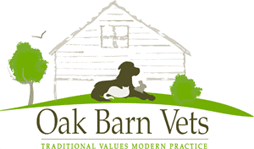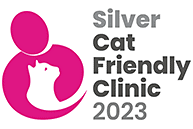Some pets manage to go their whole life without having any real health problems and some seem to attract them. Lulu is one of the latter!
Being an Old English Sheepdog she is a happy go lucky sort of girl and takes everything in her stride. From a young age she has had medical and surgical management for urinary incontinence which recently involved the use of an implanted, inflatable sphincter cuff fitted by a Veterinary Specialist.
A few weeks after surgery to remove her cuff Lulu was rushed into Oak Barn Vets as she had become progressively quiet, uncomfortable and wobbly at home. Examining her we soon discovered that she was very pale with an enlarged and painful spleen. A blood test confirmed that Lulu was not pale due to anaemia but that she was suffering from hypovolaemic shock.
This is a rapid loss of blood volume either through bleeding or it becoming trapped somewhere outside of the circulatory system. In Lulu’s case this was in her spleen due to her having a torsion or twist of the blood vessels supplying this organ.
The spleen is a large organ in the abdomen of all dogs and cats and has many purposes. It stores blood for emergencies such as loss of blood through bleeding or sudden bursts of activity when it is pushed into the bloodstream to help with oxygen supply. It also acts as a filter for damaged or old blood cells and is involved in the immune system, helping to manufacture new blood cells to replace dying ones and help to fight infections.
On occasion, we see complications with the spleen such as growths, traumatic damage and rarely, as in Lulu’s case, a torsion.
Having received high rate intra-venous fluids and pain relief, to control her shock and make her comfortable, Lulu was taken to surgery to remove her spleen. It is important in cases of splenic torsion that the blood vessels are not untwisted before the spleen is removed, this is because the old, trapped blood will be released back into circulation along with toxins and blood clots which can further lead to shock. Lulu’s splenectomy went well and her recovery was aided by a blood transfusion from her Bernese Mountain Dog friend, Lola.
Lola was incredibly brave giving donated blood after her and Lulu had been confirmed as a blood group match. There are two main blood groups in dogs DEA 1.1 positive and DEA 1.1 negative. Freshly donated blood has not only healthy blood cells but also clotting factors and platelets which are important in patients which may develop bleeding disorders through their illness. Large breed dogs, such as Lola, make great blood donors and can be real life savers in these situations.
A gastropexy was also carried out on Lulu, where her stomach is fixed in place to stop it from twisting in the future. This is because dogs that have a splenic torsion are more prone to stomach bloating and twisting (gastric dilation and volvulus) as the supporting ligaments have been stretched with the torsion.
Also given Lulu’s track record we were keen to avoid any further problems which may come her way!
For those with a strong stomach there is an album of photos found below where you can see how enormous her spleen was and how we removed it.
We are pleased to report that Lulu has made a fantastic recovery - must be something to do with having all those Bernese Mountain Dog blood cells inside her!



